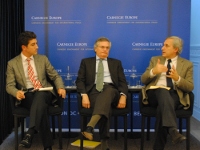Registration
Thank you!
You will receive an email confirming your registration.
IMGXYZ2737IMGZYXThe last decade has seen a marked change in both the scale of competition for resources and the interdependencies such competition entails. At an event hosted by Carnegie Europe, Jean-Marie Colombani, former editor of French daily newspaper Le Monde, and Carnegie’s Moisés Naím discussed the impact of scarcity on global security and world affairs. Fabrice Pothier, former director of Carnegie Europe, moderated.
Dynamics of Scarcity
- The Traditional Explanation: Technology and market factors have undermined the traditional Malthusian model for understanding competition for resources, which suggests that populations are growing at a faster rate than production, Naím explained. Technological advances have increased productivity so much that it can support the demands of a growing population. Market forces have also affected the distribution of products, increasing the price of goods and therefore limiting the availability of scarce resources that are in high demand, such as food.
- A Twenty-First Century Problem: In spite of such advances, humanity is now competing for resources on an unprecedented scale, Naím continued. Billions of people from emerging countries such as China and India are now entering the global market, and neither market forces nor technology will be able to fully address this increased demand. Resolving this problem of supply and demand will require new international governance regimes and cooperation on a scale the international community has thus far proved incapable of.
- Global Governance Deficit: The number of problems that demand collective action—such as terrorism, pandemics, or global warming—is growing, while the world’s capacity to deal with them collectively is either stagnant or dwindling, Naím explained. The most dangerous scarcity in international relations today, he concluded, is power: in particular, the power to bring together a number of countries that can limit or alleviate the consequences of a global problem.
Scarcity and Europe
- A European Concern: The effects of scarcity, and the way it is generally perceived, vary widely across the globe. Following the outbreak of the global economic crisis, and the severe austerity measures that it forced many European governments to adopt, scarcity became an increasingly European concern, Naim asserted. In other parts of the world, and particularly in Asia, where high growth rates have lifted millions of people out of poverty, the concept of scarcity is far less of an issue.
- Austerity: The global economic crisis, which stemmed largely from an excess of household debt in the United States, became a problem in Europe due to an excess of public-sector debt, Colombani explained. Europe and the United States have differed greatly in their attempts to tackle the crisis. The United States has focused on boosting spending, while Europe has aimed to reduce deficits. The harsh austerity measures enacted in Europe have curtailed European growth, and may in fact impede Europe’s long-term economic recovery, Colombani warned.
Europe’s Future
- Integration: The economic crisis revealed Europe’s structural weaknesses, particularly the EU’s lack of unified instruments of governance. However, the long-term threat of scarcity may move the EU to launch a new wave of integration, Colombani said. Deeper European integration, he continued, is the most effective way for European nations to fight the effects of scarcity. In an era of powerful transnational organizations, individual European nations have little leverage on the world stage. It is therefore in their best interests to abandon individual aspirations of power and work as part of a collective.
- Resources: Europe is still potentially the richest economic union in the world, Colombani noted, and it benefits from many unique resources that could counteract the threat of scarcity:
- Agriculture: Europe is a great agricultural and agribusiness power. With the population of the world rapidly growing, this represents a significant long-term asset.
- Rare Earth Metals: These metals are used in many technological devices, particularly in the IT and telecommunications sectors, and, while their production is currently limited largely to China, they are present in high quantities in many parts of Europe, particularly in Germany and Poland. However, it remains to be seen if Europe will develop the technologies to effectively exploit these deposits.
- Shale Gas: Shale gas is another natural resource that is abundant in Europe. It is an increasingly important source of energy supplies: for example, shale gas accounts for 20 percent of U.S. natural gas consumption.
- Agriculture: Europe is a great agricultural and agribusiness power. With the population of the world rapidly growing, this represents a significant long-term asset.
- Relative Decline: In the coming decades, Europe is expected to be eclipsed both economically and demographically by emerging powers such as India and China, Naím said. The EU, however, has so far failed to rise to this challenge. Europe plays a crucial role on the international stage and, to preserve its place, the EU must shift its political debate from one that focuses inward on institutional architecture to one that focuses attention on the global agenda, particularly the rise of emerging powers, Naím concluded.
- Knowledge Economy: The stark projections of Europe’s decline, Colombani argued, are not a foregone conclusion. The world is entering an era based on the “Knowledge-based Economy,” and it is well within Europe’s grasp to develop such an economy.
